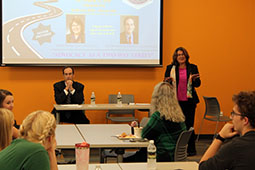Summit encourages students to advocate and lead

Photographer: Gabe Hannahsric Burchard, director of government relations at OHIO, and former Ohio legislator Debbie Phillips speak to a group of OHIO students, faculty and staff.
People are often told to walk a mile in someone’s shoes to see things from their perspective. Although no shoes were swapped, and no miles were walked during the Gladys W. and David H. Patton College of Education’s 2018 Advocacy and Leadership Summit on Oct. 11, a group of Ohio University students were still able to view things from another perspective — a more legislative one.
Guest speakers Eric Burchard, director of government relations at OHIO, and former Ohio legislator Debbie Phillips, shared tips, tricks and best practices for approaching legislators and making a difference on important legislative issues.
As the 94th District’s representative in the Ohio house for eight years, Phillips offered insider advice to the aspiring educators for making their voices heard.
For example, instead of bombarding legislators during their first day in office, Phillips suggested that individuals ask their legislator for coffee when they’re back in the district as a pathway to developing a healthy working relationship.
Phillips also encouraged attendees to share personal knowledge from their area of expertise with legislators. Phillips recalled that, when Ohio Gov. John Kasich was first elected, he wanted to reduce the local government fund by 50 percent; a county auditor spoke to some legislators about the issue by explaining what it would mean for their small county in a very calm manner.
“She said, ‘I want you to understand how small the county is,’” Phillips said. “‘If you cut the local government fund in half, we will be in a situation where we have not one person on the county payroll other than the elected office holders. So, we will have the sheriff and not one deputy. We’ll have a clerk of courts, but nobody else in that office.’”
Phillips noted that the woman continued by asking legislators if they considered what the fund reduction would mean for her area.
“I think I saw jaws literally drop; people were just looking at her like they had no idea, because they really only know what their community is like,” Phillips said. “So, they were able to put protection in place for the smallest counties to hold them at a floor of funding that would allow them to function.”
Burchard also offered several valuable tips to Summit attendees. First, he told them that people advocate for things because the issues are important to them.
“As an advocate and a lobbyist, the first thing I recommend you do is be realistic,” he said, adding to make sure they’re in it for the long-haul.
Burchard advised the group to know their audience, do their homework and to make a connection with the legislators.
Dr. Connie Patterson, assistant dean for academic engagement and outreach in the Patton College of Education, added that sometimes making a successful connection involves bringing an issue home to a person. For example, discussing teaching and education would be a prime topic to share if one were aware that a legislator was from a family of teachers.
Burchard also recommended to focus one’s message by keeping it concise and simple. And finally, he told the crowd to avoid beginning a message with a list of things they don’t like about a piece of legislation.
“Even if there’s only one thing you can support in a piece of legislation, that intersection of interest, start with that,” he said.
Overall, Patterson said she was thrilled to see such a large, diverse group of students and faculty engaged with both of the speakers.
“They asked really honest questions that I think sometimes students don’t feel comfortable asking,” Patterson said. “My hope is that this event provided the audience with applicable tools they can use to better advocate for themselves and their futures.”
Students she spoke with after the event expressed that the summit was very beneficial for them, as some didn’t know how to reach out to their congressional representative other than send an email to the [MG2] District of Columbia office. One topic of conversation at the event included contacting the congressperson’s district office in Ohio.
Cassidy Smith, a second-year master’s student studying counselor education and co-organizer of the event, said college campuses, and OHIO specifically, offer a great atmosphere for students who have interest in, and passion for, legislative advocacy.
“This was extremely insightful because, many times, we fear that our individual voice will not matter in the grand scheme of things — so it was really refreshing hearing their points of view and squashing that fear,” Smith explained. “I really believe that our voices matter, especially here on campus. The event this year can help students feel more inspired and inclined to use our voice and power for good.”
